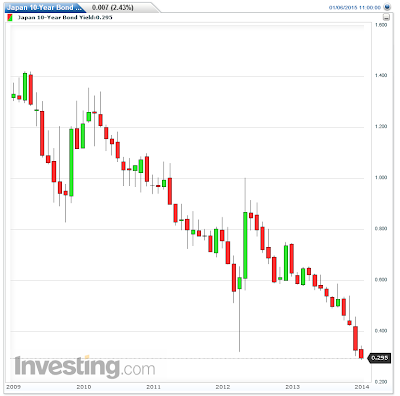Mish's Global Economic Trend Analysis |
- Germany Wins Race to Negative Yields on 5-Year Bonds; Japan Leads Germany in 10-Year Yield Race
- Economists Upbeat Despite 4th Consecutive Decline in Factory Orders; Auto Orders vs. Expectations
- Harvard Professors in "Uproar" After Learning Obamacare Applies to Them!
| Germany Wins Race to Negative Yields on 5-Year Bonds; Japan Leads Germany in 10-Year Yield Race Posted: 06 Jan 2015 01:13 PM PST Curve Watcher's Anonymous has been watching the race to zero or negative yields in government bonds. In the race to see which country will be first to hit zero percent or below on 10-year government bonds, Japan is currently in the lead at 0.295%, Germany is in second place at 0.447%, and the US trails mightily at 1.963% Japan 10-Year Bond Yield  click on any chart for sharper image Germany 10-Year Bond Yield  Japan is in the lead, but the smart bet is on Germany. The reason is German rates are negative everywhere from 1-month to 5-years. Germany 5-Year Bond Yield  Blue Ribbon Winner Announced Germany wins the coveted gold medal in the prestigious 5-year yield category in a stunning come-from-behind victory after trailing by as much as 130 basis points (1.3 percentage points) as recently as 2010. Yield on the Spanish 10-year bond is 1.64% compared to 1.963% on the 10-year treasury note. ECB president Mario Draghi believes QE pushing rates even lower will cure Europe. With yields this low, how can QE possibly do anything other than create even greater risk in sovereign bond speculation? Mike "Mish" Shedlock http://globaleconomicanalysis.blogspot.com |
| Economists Upbeat Despite 4th Consecutive Decline in Factory Orders; Auto Orders vs. Expectations Posted: 06 Jan 2015 10:20 AM PST Economists are among the most optimistic groups on the planet. Year in, year out they project improvements in growth. So today, despite 4th Consecutive Decline in Factory Orders, it's no surprise that economists remain optimistic. Orders to U.S. factories fell for a fourth straight month in November, with demand in a key category that signals business investment plans down for a third month.New Order Details The US Census Bureau Manufacturers' Shipments, Inventories and Orders Report for November 2014 shows New orders for manufactured goods are down for four consecutive months. Overall Highlights
Transportation Equipment
Auto Orders vs. Expectations Automobiles orders down 2.0% and heavy duty trucks down 4.4% are standouts. Those numbers suggest the auto party is over or will soon be. I have a simple question: Who wants a car, needs a car, can afford a car, and does not have a car? Subprime auto loans are a key reason car sales were as robust as they have been. Nonetheless (from the first link) "Auto sales are expected to reach their highest level in a decade this year, bolstered by strong job gains and cheap gas." Mike "Mish" Shedlock http://globaleconomicanalysis.blogspot.com |
| Harvard Professors in "Uproar" After Learning Obamacare Applies to Them! Posted: 06 Jan 2015 12:22 AM PST In what has to be the funniest as well as most ironic post to date on Obamacare, the New York Times reports Harvard Ideas on Health Care Hit Home, Hard. For years, Harvard's experts on health economics and policy have advised presidents and Congress on how to provide health benefits to the nation at a reasonable cost. But those remedies will now be applied to the Harvard faculty, and the professors are in an uproar.Icing on the Hypocrite's Cake "None of us who protested was motivated by our own bottom line so much as by the principle," Ms. Lewis said, expressing concern about the impact of the changes on lower-paid employees.Obviously there are principles for Harvard employees and other principles for everyone else. It's shocking, just shocking, that Obamacare apply to those who are responsible for making it happen. Mike "Mish" Shedlock http://globaleconomicanalysis.blogspot.com |
| You are subscribed to email updates from Mish's Global Economic Trend Analysis To stop receiving these emails, you may unsubscribe now. | Email delivery powered by Google |
| Google Inc., 1600 Amphitheatre Parkway, Mountain View, CA 94043, United States | |
No comments:
Post a Comment